Unit3 Lesson 1 Festivals教案 北师大版必修1
北师大版高中英语必修第1册 Unit 3 Lesson1 Festivals

Lead-in:
1 What is your favourite season?
2 What festivals happen during your favourite season?
3) Can you say something about the lanterns in the past and that nowadays? (Paragraph 3)
The Dragon Boat Festival 4)How long is the history of the Dragon Boat Festival?
Unit 3 Celebration
Lesson 1 Festivals
Unit 3 Lesson 1
Festivals
Objectives:
1 To learn about festivals.
2 To read a text quickly to find specific information.
Dragon Dance
sweet dumplings
Marks the end of Chinese New Year celebrations
Now read the texts aloud and then answer the following questions.
The Mid-Autumn Festival 1)What is the moon said to be on the Mid-Autumn
2)The activities and the food
北师大版高中英语必修1Unit3教案1 Festivals

FestivalsObjectives■To use pictures to help understand new words and to use the dictionary to check meanings.■To read a text quickly to find specific information. ■To practise the Present Simple Passive, PresentContinuous Passive, Past Simple Passive, Present Perfect Passive and Past Continous Passive. Resource usedGrammar Summary 5.Possible problemsStudents should be encouraged to use the Passive. It is used more in English than in many other languages.Background Communal celebrations mark events such as changing seasons, religious days or political events; music, dance or costume are usually involved. Routes through the material■If you are short of time, set some of the exercises for homework.■If you have time, use one of the Options ideas.■If you have two periods for this lesson, a suitable natural break is after Exercise 4.Language Power: pages 76?C77. Mini-Grammar 9ReadingBefore you startExercise 1■Students look at the pictures and guess what is happening and what is being celebrated. Ask them to describe what they can see.■Students discuss what their favourite seasons are and list the festivals in China which are associated with each season. Read to learnExercise 2■Students look at the three titles (Summer, Autumn, Winter) and suggest which festivals are associated with these three seasons in China and if there are any associated with Spring.■Students read the texts quickly and do the matching.AnswersC the Dragon Boat Festival A the Mid-Autumn FestivalB the Lantern FestivalExercise 3■Divide the class into three groups. Each group reads one section of the text carefully and writes four or five questions about it. Then give the class three orfour minutes to read the whole text again. Students close their books, and in turn each group asks its questions for the rest of the class to answer.■Students read the text again and fill in the table with the text information they get.■Have students check their answers in pairs.■Encourage students to add another festival they know well.■Students read the questions and find the answers in the texts by reading the texts again.■Have students talk about their festival in pairs.AnswersPassage A:the Mid-Autumn Festival, September or October, moon cakesPassage B:the Lantern Festival, the fifteenth of the first month of the lunar calendar, sweet dumplings Passage C:the Dragon Boat Festival, the fifth day of the fifth month of the lunar calendar, ZongziExercise 4■Students discuss in pairs and tell the class their opinions.GrammarTHE PASSIVE (I)Exercise 5■Students identify that the passive is used when we don’t know or there is no need to say who the “doer” of an action is.■Students then do the exercise, finding the sentences in the text and completing the verbs.■Refer students to Grammar Summary 5 to make sure they understand how to use the Passive correctly.■For further practice, ask students to answer questions about their school (or town), e.g. “When are school examinations held?When are school reports written? Where is football played?When are bells rung? When was this classroom cleaned? When was this school built?”Answers1. are made2. were, organisedExercise 6■ Have students look at the given sentences and ask them what tenses are used in them.■ Encourage students to draw rules for the formation of the passive forms. Ask them to refer Grammar Summary 1,3,4 and 5 on pages 92?C93.Answers1. has been arranged2. is being collected3. was being paintedExercise 7■ Ask students if they have heard of the Water Festival.■ Students read the text to find out about the festival. Then read the text again and complete the verbs.Answers1. is celebrated2. is splashed3. are carried4. are told5. is related6. are washed7. are raced 8. are launched■ Have students close their books and ask them to say what they can remember about the festival.Exercise 8■ Students work in pairs, changing the sentences into the passive. Answers1. My health is being affected by stress.2. People are being moved out of the houses.3. The mini-helicopter has already been invented by him.4. The forest fire has been put out by them.5. The car was being repaired when I got there.6. The house was being decorated when the accident happenedVocabularyExercise 9■ Students may need to go back to the text to review the words before they start filling in the blanks.Answers1. is lit2. has decorated3. mark4. celebrate5. was included6. was burnt down7 take part in 8. be boiledLanguage in UseExercise 10■ Students work in groups, writing out the questions andadding more of their own questions using the Passive. Tell students they must know the answers to their questions. If you wish, they can finish the questions for homework and use reference sources to check their answers. Each group should have between 10?C15 questions.Answers1. Where is the Mid-Autumn Festival celebrated? (In China)2. Where is “zongzi” eaten? (In China)3. When is the Lantern Festival celebrated? (In China)4. Who was the telephone invented by? (By Alexander Graham Bell)5. Who was Romeo and Juliet written by? (By William Shakespeare)6. Where are BMW cars made? (In Germany)OptionsPracticeIn groups, students prepare a written description of SpringFestival in China. Tell students they are writing for English speaking readers who have not visited China. Students can follow the structure of the texts in the coursebook and, if possible, illustrate their text with a suitable drawing or photograph. When the groups have finished, they can exchange papers for others to read.ExtensionStudents, working individually or in pairs, carry out a research project (using reference books or the Internet) to find out about a seasonal festival in another country. Students then prepare a short talk about this festival to give to the class.。
Unit3lesson1Festivals学案北师大版必修1全面版
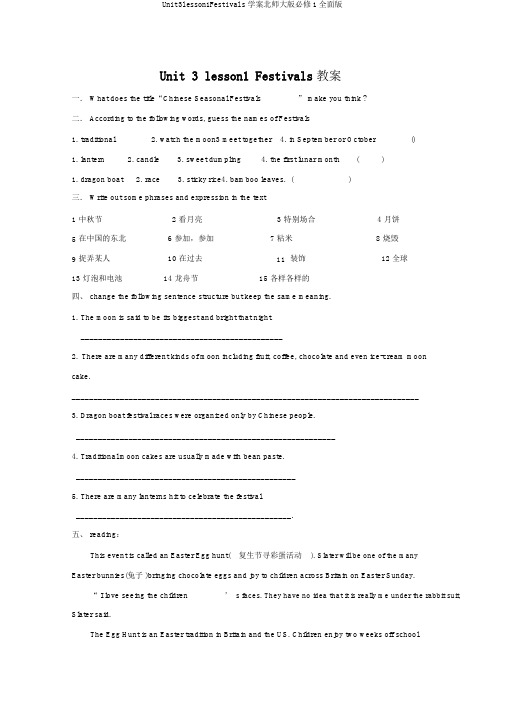
Unit 3 lesson1 Festivals教案一. What does the title“Chinese Seasonal Festivals” make you think ?二. According to the following words, guess the names of Festivals1. traditional2. watch the moon3 meet together 4. in September or October()1. lantern2. candle3. sweet dumpling4. the first lunar month()1. dragon boat2. race3. sticky rice4. bamboo leaves. ()三. Write out some phrases and expression in the text1中秋节 2 看月亮 3 特别场合 4 月饼5在中国的东北 6 参加,参加7 粘米8 烧毁9捉弄某人10 在过去11装饰12 全球13 灯泡和电池14 龙舟节15 各样各样的四、 change the following sentence structure but keep the same meaning.1.The moon is said to be its biggest and bright that night.______________________________________________2.There are many different kinds of moon including fruit, coffee, chocolate and even ice-cream mooncake._______________________________________________________________________________3.Dragon boat festival races were organized only by Chinese people.___________________________________________________________4.Traditional moon cakes are usually made with bean paste.__________________________________________________5.There are many lanterns hit to celebrate the festival._________________________________________________.五、 reading:This event is called an Easter Egg hunt(复生节寻彩蛋活动). Slater will be one of the manyEaster bunnies(兔子 )bringing chocolate eggs and joy to children across Britain on Easter Sunday.“ I love seeing the children’ s faces. They have no idea that it is really me under the rabbit suit, Slater said.The Egg Hunt is an Easter tradition in Britain and the US. Children enjoy two weeks off school.And most adults get Good Friday (the Friday before Easter) and Easter Monday off work.With all this fun, it’ s easy to forget the reason for Easter.It is a Christian festival. Good Friday remembers the day Jesus Christ died, and Ester Sunday celebrates his resurrection( 复生 ). The date of Easter changes each year, but it is always in Marchor April.Easter marks the end of a time called Lent( 四旬斋 ), which lasts for 40 days.During this period, many British people give up something they enjoy. Children often give up chocolate and are rewarded with chocolate eggs on Easter Sunday.Easter is also a family time, Families come together to enjoy traditional food, such as hot cross buns(圆面包). These are bread buns with a cross on top, which represents(代表)the cross upon which Jesus died. Other traditional foods include roast lamb( 烤羊肉 ) and roast duck.Easter is a holiday enjoyed by all, especially children. As 8- year- old Kierran Mann, from the north of England, says,“ I love Easter because I love holidays andchocIl o lateve.”1. John Slater will dress in a giant rabbit suit and parade in front of over 100 people because ____.A. he is sick in mindB. he hopes to celebrate Easter in this wayC. he likes making people surprised in a special wayD. he doesn ’ t want people to see his face2. According to the passage, we know Jesus Christ died on _____.A. SundayB. MondayC. FridayD. Saturday3.Kierran-Mann enjoys Easter because _____.A.he can receive many presents from his friendB.he can spend most of his time playing with his friendsC.he has time to enjoy traditional food, such as hot cross bunsD.he loves holidays and chocolate4.During Easter, people usually enjoy _____ food.A. home cookedB. traditionalC. fastD. sweet答案二、 1. the Mid-Autumn Festival 2. the Lantern Festival 3. the Dragon Boat Festival三、 1. the Mid-Autumn Festival5. in the north-eastern part of China somebody10. in the past 2. watch the moon6. take part in11. decorate with3. a special occasion4. moon cakes7. sticky rice8. burn down12. all over the world13. light bulbsand batteries14. the Dragon Boat Festival15. all kinds of四、 1. It is said that the moon is its biggest and bright that night.2.There are many different kinds of moon, fruit, coffee, chocolate and even ice-cream moon cake included.3.Only Chinese people organized dragon boat festival races.4.People make traditional moon cakes with bean paste.5.There are many lanterns which are hit to celebrate the festival.五、 BCDB选择朋友要经过周密观察,要经过命运的考验,不论是对其意志力还是理解力都应早先检验,看其能否值得信任。
北师大版高一英语必修一3.1《festivals》教案设计
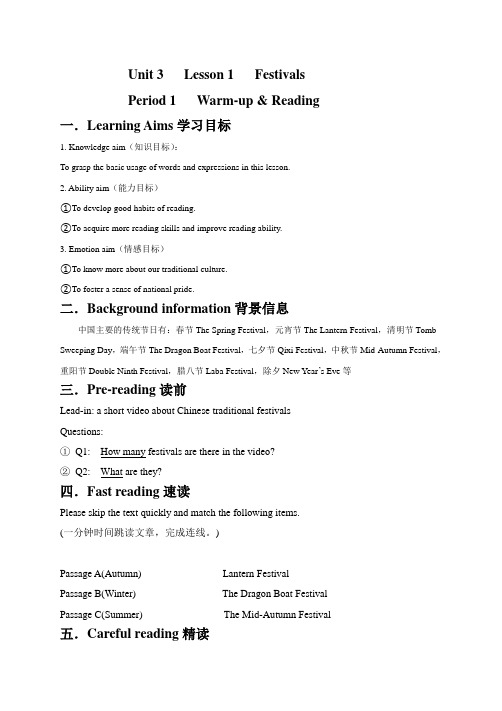
Unit 3 Lesson 1 FestivalsPeriod 1 Warm-up & Reading一.Learning Aims学习目标1. Knowledge aim(知识目标):To grasp the basic usage of words and expressions in this lesson.2. Ability aim(能力目标)①To develop good habits of reading.②To acquire more reading skills and improve reading ability.3. Emotion aim(情感目标)①To know more about our traditional culture.②To foster a sense of national pride.二.Background information背景信息中国主要的传统节日有:春节The Spring Festival,元宵节The Lantern Festival,清明节Tomb Sweeping Day,端午节The Dragon Boat Festival,七夕节Qixi Festival,中秋节Mid-Autumn Festival,重阳节Double Ninth Festival,腊八节Laba Festival,除夕New Year’s Eve等三.Pre-reading读前Lead-in: a short video about Chinese traditional festivalsQuestions:①Q1: How many festivals are there in the video?②Q2: What are they?四.Fast reading速读Please skip the text quickly and match the following items.(一分钟时间跳读文章,完成连线。
北师大版高一Unit3CelebrationLesson1Festivals教学设计

北师大版高一Unit3CelebrationLesson1Festivals教学设计北师大版高一Unit 3 Celebration Lesson 1 Festivals教学设计一. 教材分析1.本课在本单元的地位和作用:本单元的主题为festival“节日”, 主要介绍中外国家的一些主要的节日和节日的庆祝活动.通过本课的学习,学生能够了解一些我们国家和西方的主要节日和活动,熟悉并掌握在谈论这些节日时需要的话题和重要词汇及短语,最后通过自主学习和合作学习实现用英语简单的介绍一个主要节日.这样就为后几课在语言知识和语言技能上做好了铺垫.2.教学目标分析:本文文章结构非常简洁明了,分别描述了中国的三个传统节日:中秋节, 元宵节和端午节和西方比较重要的两个节日:圣诞节和万圣节。
由于本文是单元导读课, 因此学生通过听、说、读、写等一系列活动掌握并运用所学语言知识是本文的重点.根据新课标中强调“要注重提高学生用英语进行思维和表达的能力”这一要求,结合教学内容和学生特点及实际情况, 我就把最终的语言输出设置为:创造一个新的节日:学生节。
二. 学生分析由于我们的学生学习水平参差不齐,而且基础较差,因此在设计学生活动时要考虑到不同层次学生的具体情况和不同需求.因此,我在教学中设置了不同层次的问题,设定了不同层次的目标,如: A层同学介绍节日时选三个话题讨论,B 层同学选四个话题讨论,C层即最高级选五个以上话题进行介绍.这样就满足不同学生的发展要求,这也是新课标所倡导的.三.教学目标1)学会用英语简单介绍中西方的节日。
2)进一步了解我国的一些主要的节日及其相关的历史源源,从而尊重传统文化,增强爱国主义精神。
3)发挥团队合作精神,创作学生节海报。
4)通过文化的了解,增强爱国主义精神和民族自豪感,提高对中外文化异同的敏感性和鉴别能力,为跨文化交际能力打下基础。
重点与难点:1)如何让学生在阅读活动中获取信息,理解全文。
北师大英语必修1unit 3 Lesson1 Festivals 课程设计

7、stepⅦ. The resign of the writing on the bl ackboard 板书设计 Unit 3 Celebration
Reading: Festivals
Phrases:
be made with,be made of, be made for,be celebrated by take part in,join,join in, be organized by,be lit,burn down be decorated with,be decorated by Sentence pattern:am/is/are + 过去 分
一般现在时的被动:am/is/are + 过去分词; 一般过去时的被动:was/were + 过去分词; 现在进行时的被动:have/has + being + 过 去分词;
现在完成时的被动:have/has + been + 过去 分词)
2、技能目标 (1)通过系列阅读提高学生的阅读 理解能力;
将要感知的过程或要学习的技能记录 下来播放、演示,通过不同形式的直 观化方式,增强学生的感性认识或在 已有理性认识的情况下,再通过感性 材料深化理性的认识。借助现代教学 媒体(PPT),可以化静态为动态,因 而其逼真程度和直观程度更高。
3、讨论法 在教师的指导下,由全班或小组
学生围绕某一问题进行交流、切磋, 从而相互学习。这样既可以发挥教师 的主导作用,也可以有效地体现学生 的主体地位,是师生交流最为直接的 一种方法。学生在群体思考过程中, 相互启发、相互激励,可以有效地加 深学生对所学知识的理解。
其次,教学内容设计要符合本
班学生的实际情况,难度适中,尽 量满足不同类型和不同层次学生的 要求。在任务的设置中应充分考虑 学生是否能够完成。本堂课的细节 理解部分难度合适,大多数学生都 能顺利完成。
北师大必修一 Unit3 Lesson1 Festivals 说课

01 My Understanding Of The Lesson
Teaching key points
• To train the students’ reading ability • To help the students understand the
fast reading
5
task-based teaching
6
pair or group work
7
free discussion 8
04
The Teaching
Procedure
The Teaching Procedure
STEP 1 LEAD IN
• PURPOSE
TT
• To increase the students’ interest and attract their attention .
main idea of the passage
01 My Understanding Of The Lesson
• To develop the students’ reading ability • To help the students grasp the detailed
information of each paragraph and the whole passage
self-dependent 1 learning method
cooperative 2 learning method 3 carefully reading
modern 4 equipment
高中英语北师大版必修1教案-Uint3Celebration-Festivals

高中英语北师大版必修1教案-Uint3Celebration-FestivalsInstructional DesignModule 1 Unit 3 CelebrationLesson 1 Festivals1st period ReadingChen XiaoqingNo. 14 Junior& Senior School of Luoyang136********北师大版高中英语必修一第三单元第一课《节日》教学设计表年级高一学时45分钟教学目标学习与节日有关的词组、表达法,快速浏览文章,获取信息,掌握相关词汇句型教学重点难点从文章中获取、处理主要信息,正确理解课文细节,从而生成影片配音、写作文段。
学习者分析学生对于该话题核心词汇接触少,记忆单词效率低,小组学习处于磨合期。
教学环节教学内容活动设计活动目标媒体使用及分析(白板使用功能)导入传统民族音乐播放;季节、节日名称回顾与强化。
民乐欣赏,图片与季节、节日名称匹配营造传统节日氛围,唤醒学生对于季节、节日名称的记忆与使用刺激学生眼睛、耳朵,鼓励大家开口说英语,学生学习层级直接展示阅读竞赛阅读能力训练,整合课文材料,按照C-B-A顺序展开训练。
小组间互相设问、教师追问,新闻播报,文段理解填空等掌握预测、跳读、细读技巧,提高阅读策略掌握能力播放题库、检测小组活动成果、讲评反馈巩固文章总结,盘活学生当堂收获和背景知识。
视频配音中国传统节日推广竞赛回顾文章要点,从词到句、段落、文章,巩固课节知识要点,把阅读训练落实到语言掌握上。
小组成员比赛情况记录,辅助成果展示。
总结如何介绍一个节日,中国节日的重要性。
讨论发散思维,激发民族自豪感。
总结小组表现,激励合作。
作业撰写一篇节日短文。
主题:我最喜爱的中国传统节日。
写作课外消化所学,检测话题词汇,提高词汇学习兴趣。
提纲挈领明确要求,鼓舞士气。
教学反思容量安排适合学生水平。
多途径摸排、提高学生阅读层级提升阅读理解能力,掌握节日表达法。
【英语】unit3 lesson1Festivals (北师大版必修1)课件

T
6.The Lantern Festival marks the beginning of the
Chinese New Year celebrations. F
Read the text again and fill in the table with the information you read from the texts.
1.The Mid-autumn Festival is celebrated by Chinese
people only in China. T 2.Traditional moon cakes are usually made with fruit F.
3.In the past, dragon boat races were organised only
Complete the passage with the correct forms of the words below.
moon cake, lantern, bean paste, candles, sweet dumplings, shape, sticky rice, boil serve,decorate
5. I _w_a_s_in_c_lu_d_ed_ in the soccer team when the best player broke his leg.
6.The schoolwa_s_b_u_rn_t_d_o_wn by a mad man. Only two classrooms still stand.
September or
1.meet in the evening 2.watch the moon
October
北师大版必修一Unit3 Lesson1 Spring Festival教学设计
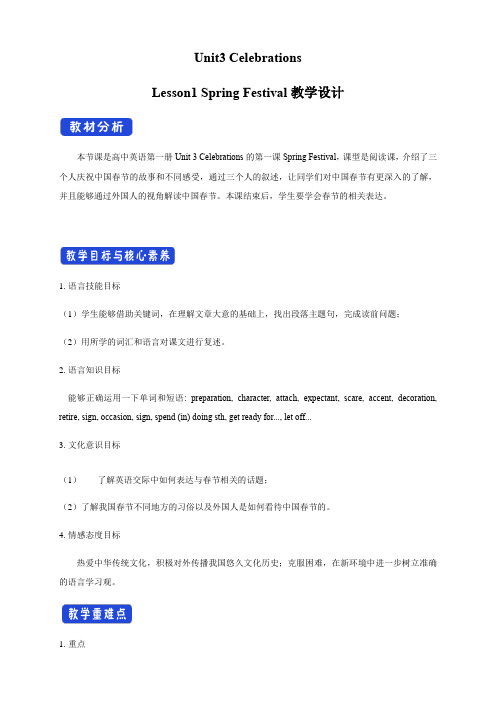
Unit3 Celebrations
Lesson1 Spring Festival教学设计
本节课是高中英语第一册Unit 3 Celebrations的第一课Spring Festival,课型是阅读课,介绍了三个人庆祝中国春节的故事和不同感受,通过三个人的叙述,让同学们对中国春节有更深入的了解,并且能够通过外国人的视角解读中国春节。
本课结束后,学生要学会春节的相关表达。
1.语言技能目标
(1)学生能够借助关键词,在理解文章大意的基础上,找出段落主题句,完成读前问题;
(2)用所学的词汇和语言对课文进行复述。
2.语言知识目标
能够正确运用一下单词和短语: preparation, character, attach, expectant, scare, accent, decoration, retire, sign, occasion, sign, spend (in) doing sth, get ready for..., let off...
3.文化意识目标
(1)了解英语交际中如何表达与春节相关的话题;
(2)了解我国春节不同地方的习俗以及外国人是如何看待中国春节的。
4.情感态度目标
热爱中华传统文化,积极对外传播我国悠久文化历史;克服困难,在新环境中进一步树立准确的语言学习观。
1.重点
(1)如何使用地道表达春节相关的话题。
(2)能够运用所学对春节进行介绍。
2. 难点
能用得体的用英语表达自己春节以及自己喜欢的过春节方式。
高中英语北师大版必修1 Unit3 Celebration《Lesson1 Festivals》优质课公开课教案教师资格证面试试讲教案
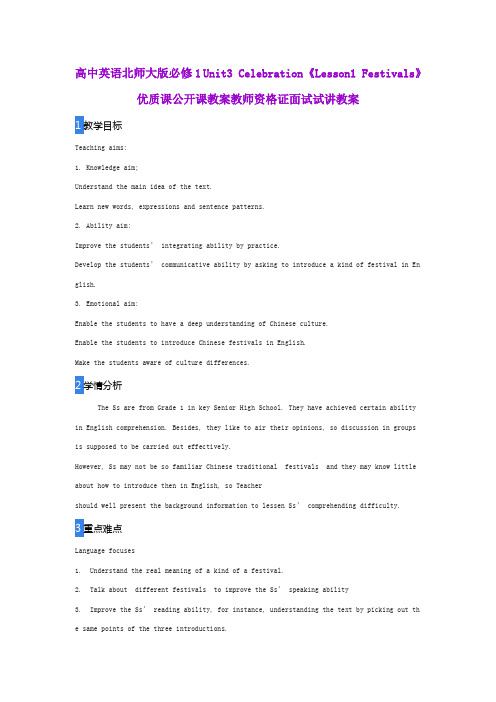
高中英语北师大版必修1Unit3 Celebration《Lesson1 Festivals》优质课公开课教案教师资格证面试试讲教案1教学目标Teaching aims:1. Knowledge aim;Understand the main idea of the text.Learn new words, expressions and sentence patterns.2. Ability aim:Improve the students’ integrating ability by practice.Develop the students’ communicative ability by asking to introduce a kind of festival in En glish.3. Emotional aim:Enable the students to have a deep understanding of Chinese culture.Enable the students to introduce Chinese festivals in English.Make the students aware of culture differences.2学情分析The Ss are from Grade 1 in key Senior High School. They have achieved certain ability in English comprehension. Besides, they like to air their opinions, so discussion in groups is supposed to be carried out effectively.However, Ss may not be so familiar Chinese traditional festivals and they may know little about how to introduce then in English, so Teachershould well present the background information to lessen Ss’ comprehending difficulty.3重点难点Language focuses1. Understand the real meaning of a kind of a festival.2. Talk about different festivals to improve the Ss’ speaking ability3. Improve the Ss’ reading ability, for instance, understanding the text by picking out the same points of the three introductions.。
北师大版高中英语必修一第三单元Lesson 1 Festivals教案
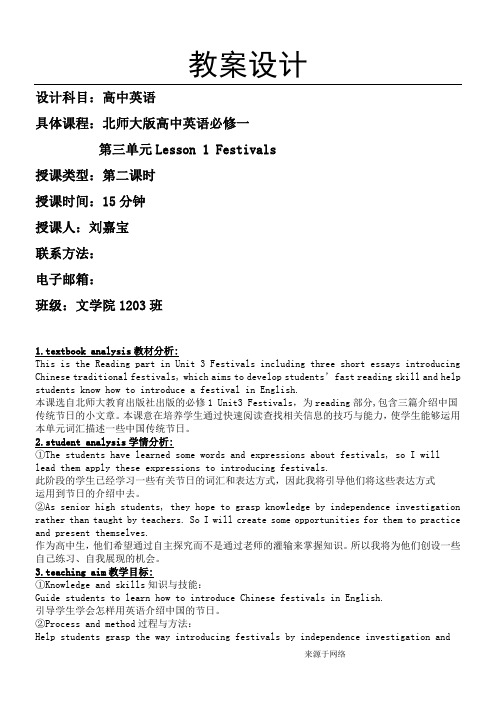
教案设计设计科目:高中英语具体课程:北师大版高中英语必修一第三单元Lesson 1 Festivals授课类型:第二课时and helprather than taught by teachers. So I will create some opportunities for them to practice and present themselves.作为高中生,他们希望通过自主探究而不是通过老师的灌输来掌握知识。
所以我将为他们创设一些自己练习、自我展现的机会。
3.teaching aim教学目标:①Knowledge and skills知识与技能:Guide students to learn how to introduce Chinese festivals in English.引导学生学会怎样用英语介绍中国的节日。
②Process and method过程与方法:Help students grasp the way introducing festivals by independence investigation anddevelop their ability to use knowledge.帮助学生通过自主探究掌握介绍节日的方法,培养他们的知识运用能力。
③Emotional attitude and value orientation情感态度与价值观:Enhance students’ senses of national pride by learning to introduce some traditional festivals.通过介绍一些传统节日增强学生的民族自豪感。
4.Teaching point教学重难点:Guide students to introduce Chinese traditional festivals by themselves using the knowledge they have learnt.引导学生灵活运用所学知识介绍中国传统节日。
Unit3《Celebration》Lesson1 Festivals教案3(北师大版必修1)

A Teaching Plan forUnit 3 CelebrationLesson 1 FestivalsTaught by: Wang HongTeaching place: Multi-media classroom(多媒体教室) Teaching class: Class One, Grade OneTeaching time: the fifth class on ThursdayGeneral objectives:1.To read to learn the main Chinese seasonal festivals and their history origin and meanings.2.To help them learn some phrasal verbs and functional items about the topic and try to use them.Language aim:1.Phrases:Be celebrated by, fall on , mark, be decorated with, tradition/traditional, serve, take part in, get together2.important sentences:The Mid-Autumn Festival is celebrated by Chinese people.The Lantern Festival falls on the fifteenth day of the first lunar month.It marks the beginning of the hottest season of the year.Ability aim:1).Improving the ability of getting the general information and specific information from reading a text.2). Using own words to describe some important Chinese festivals. Emotion aim:To promote students’ qualities of a patriotism(爱国主义精神,爱国心) by learning the main Chinese festivals and learn their history origin and their meanings。
高中英语北师大版模块1【教学设计】unit3 lesson1 Festivals

Unit3Lesson1 Festivals【知识与能力目标】To usepictures to help understand new words and to use thedictionary to check meanings.【过程与方法目标】To read a text quickly to find specific information.【情感态度价值观目标】To practise the Present Simple Passive, PresentContinuous Passive, Past Simple Passive, Present Perfect Passive and Past Continous 【教学重点】practice students’ expressing ability【教学难点】To review and practice using countable and uncountable nounsTape recorder, MultimediaReadingBefore you startExercise 1■ Students look at the pictures and guess what is happening and what is being celebrated. Ask them to describe what they can see.■ Students discuss what their favourite seasons are and list the festivals in Chinawhich are associated with each season. Read to learnExercise 2■Students look at the three titles (Summer, Autumn, Winter) and suggest which festivals are associated with these three seasons in China and if there are any associated with Spring.■Students read the texts quickly and do the matching.AnswersPicture 1?CC the Dragon Boat FestivalPicture 2?CA the Mid-Autumn FestivalPicture 3?CB the Lantern FestivalExercise 3■Divide the class into three groups. Each group reads one section of the text carefully and writes four or five questions about it. Then give the class three orfour minutes to read the whole text again. Students close their books, and in turn each group asks its questions for the rest of the class to answer.■Students read the text again and fill in the table with the text information they get. ■Have students check their answers in pairs.■Encourage students to add another festival they know well.■Students read the questions and find the answers in the texts by reading the texts again.■Have students talk about their festival in pairs.AnswersPassage A:the Mid-Autumn Festival, September or October, moon cakesPassage B:the Lantern Festival, the fifteenth of the first month of the lunar calendar, sweet dumplingsPassage C:the Dragon Boat Festival, the fifth day of the fifth month of the lunar calendar, Zongzi Exercise 4。
高中英语Unit3Lesson1SpringFestival教案北师大版必修第一册

Unit 3 CelebrationsLesson 1 Spring FestivalTeaching Objectives:·To read and talk about the Spring Festival·To train the students’ skimming and summarizing ability during reading the text ·To read for specific information and understanding words in context·To love and carry forward Chinese traditional cultureDifficult Points and Important Points:·Students may have difficulty introducing Spring Festival·Students shall learn much more about Chinese traditional cultures and carry forward them.Teaching Methods:·Task-based teachingTeaching Aids:·a multimedia classroom·the blackboard·12xueTeaching Procedures:Step 1: Warm-up(1)Students watch a short video about Spring Festival.(2)How do you and your family celebrate Spring Festival?.Step 2: Fast readingRead the notes from the editor and look at the three pictures, and try to make predictions of the main idea of the text.Step 3: Careful readingRead again. Find out each person's experience of Spring Festival In the three accounts. Take notes.Tom JenkinsXu GangLi YanStep 4: Post readingWhy does Spring Festival have different meanings in their eyes?What does Spring Festival mean to Chinese people?Step 5: DiscussionDo we celebrate Spring Festival in the same way as years before?Step 6: HomeworkRetell the text with the help of the mind map;The Spring Festival of 2022 is coming, how do you plan to celebrate it? Teaching ReflectionBlackboard DesignUnit 3 CelebrationsLesson 1 Spring FestivalDate:the 1st day of the 1st month of the lunar yearMarks:the beginning of New YearStarted:more than 2,500 years agoTypical activities:spring cleaning, paper cutting……Special food: jiaozi……。
Unit3《Celebration》Lesson1 Festivals教案2(北师大版必修1)

Unit 3 Lesson 1 Festivals Teaching Aims1.Improve the Ss’reading ability.2.Help the Ss know more about Chinese festivals.Teaching Important PointsTrain the Ss’reading ability and develop their reading skills. Teaching Difficult PointsHow to help the Ss understand the texts better.Teaching ProceduresStep I GreetingsGreet the whole class as usual.Step II Discussion and Lead-inStudents dicuss in pairs or groups about their favorite seasons and list the festivals in China which are associated with each season.After discussion, show some pictures to the class and try to guess what is happening and which festival is being celebrated in each picture. Encourage them to describe what they see in the pictures.Step III Fast-readingAsk Ss to read the texts quickly and then do the matching. Step IV Intensive-readingAsk the Ss to read the texts carefully and fill in the table on the books beside the texts. Then, they can discuss with their partners about their answers. The teacher ask several Ss to come to the blackboard and write their answers down. At last, check answers together.Step V DiscussionSs discuss in pairs and tell the class their opinions on the following questions:1.Do you think too much money is spent at festival times?Why or why not?2.Which festival in China is most important for you and why? Step V Summary and HomewokGive a summary of this lesson and ask students to finish the exercises and preview Lesson 2.。
高中英语 Unit3 Lesson1 P1教学设计 北师大版必修1
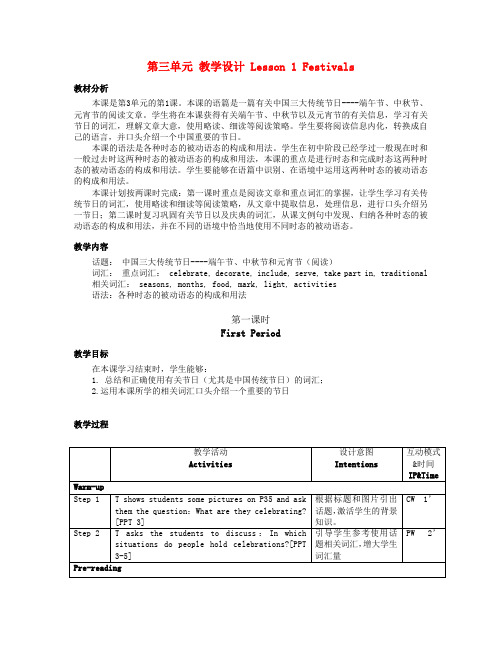
第三单元教学设计 Lesson 1 Festivals教材分析本课是第3单元的第1课。
本课的语篇是一篇有关中国三大传统节日----端午节、中秋节、元宵节的阅读文章。
学生将在本课获得有关端午节、中秋节以及元宵节的有关信息,学习有关节日的词汇,理解文章大意,使用略读、细读等阅读策略。
学生要将阅读信息内化,转换成自己的语言,并口头介绍一个中国重要的节日。
本课的语法是各种时态的被动语态的构成和用法。
学生在初中阶段已经学过一般现在时和一般过去时这两种时态的被动语态的构成和用法,本课的重点是进行时态和完成时态这两种时态的被动语态的构成和用法。
学生要能够在语篇中识别、在语境中运用这两种时态的被动语态的构成和用法。
本课计划按两课时完成:第一课时重点是阅读文章和重点词汇的掌握,让学生学习有关传统节日的词汇,使用略读和细读等阅读策略,从文章中提取信息,处理信息,进行口头介绍另一节日;第二课时复习巩固有关节日以及庆典的词汇,从课文例句中发现、归纳各种时态的被动语态的构成和用法,并在不同的语境中恰当地使用不同时态的被动语态。
教学内容话题:中国三大传统节日----端午节、中秋节和元宵节(阅读)词汇:重点词汇: celebrate, decorate, include, serve, take part in, traditional 相关词汇: seasons, months, food, mark, light, activities语法:各种时态的被动语态的构成和用法第一课时First Period教学目标在本课学习结束时,学生能够:1. 总结和正确使用有关节日(尤其是中国传统节日)的词汇;2.运用本课所学的相关词汇口头介绍一个重要的节日教学过程注: IP=Interactive Pattern; T=Teacher; Ss=Students; CW=Class Work; IW=Individual Work; PW= Pair Work; GW=Group Work第一课时学案I. Listening: Which five celebrations do you hear?Ⅲ. Fast reading:1) What do the Lantern Festival and the Dragon Boat Festival mark?2) Why is the Mid-Autumn Festival so important?Ⅴ. Group work: Introduce a festival which is most important in China for children, or for young people, or for old people, or for women and men.第一课时讲义(见PPT)第二课时(second period)北京市十一学校于艳教学目标在本课学习结束时,学生能够:1.学生能够识别五种时态的被动语态;2.学生能够在上一课的基础上,运用所学词汇和不同的被动语态进行口头介绍庆祝活动。
北师大Unit3Celebration之Lesson1Festivals

北师大必修一Unit 3 Celebration之Lesson 1 FestivalsThe first period教学设计教学目标:学生基本了解词汇celebrate, occasion, burn down, decorat e…with…, take part in, include, serve, relate to, destroy. 本课是第3单元的第1课。
本课的语篇是一篇有关中国三大传统节日----端午节、中秋节、元宵节的阅读文章。
学生将在本课获得有关端午节、中秋节以及元宵节的有关信息,学习有关节日的词汇,理解文章大意,使用略读、细读等阅读策略。
学生要将阅读信息内化,转换成自己的语言,并口头介绍一个中国重要的节日。
教学过程:一、导入和热身环节活动一、学生讨论中秋节活动二、欣赏视频“中国人在欧洲过中秋节”,完成任务视频的主要内容和一个填空练习二、读前活动从视频引出中国人过哪些节日,让学生说说他们知道的中国节日有哪些。
此环节过渡到粗读环节三、Skimming和scanning环节任务一、“文章给我们提供了更多中国的节日,你能找出有哪几类吗?分别是什么?”四、任务二、再读全文,找出与划线单词同义的词五、Detailed reading此环节创设了一个游戏环节,学生分成四组,以spring\summer\autumn\ winte r为季节,然后将四个季节分给四个小组,作为小组话题,给学生2分钟时间准备,找出关于各个季节节日的相关信息,如节日名称、举办地点、人们通常会做什么?为什么要举行这样一个节日?学生找到这些信息以后,让学生自由选择感兴趣的节日来说说。
并以这些常见节日设置对话模式、report模式、fill in the blank 模式。
六、Post-reading环节设计了三个选择题,有利于学生更加深入地理解文章的内容七、对文章进行summary 选词填空教后反思:一、教学亮点本节课基本上达到了教学目标,课堂教学比较顺利,跟学生的配合也很融洽,贯穿课堂的小组竞赛模式一定意义上带动了学生的积极性,增强了学生的团队合作意识。
北师大高中英语必修一 Unit3 Lesson 1 Spring Festival 教学设计
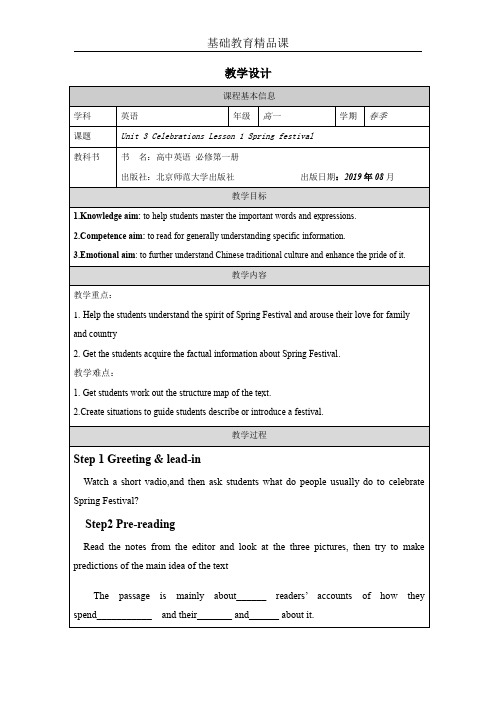
3.Emotional aim: to further understand Chinese traditional culture and enhance the pride of it.
For Li Yan, Spring Festival is_____________________
Step4 Further Thinking
1.Why does Spring Festival have different meanings in their eyes?
备注:教学设计应至少含教学目标、教学内容、教学过程等三个部分,如有其它内容,可自行补充增加。
教学内容
教学重点:
1.Help the students understand the spirit of Spring Festival and arouse their love for family and country
2. Get the students acquire the factual information about Spring Festival.
Watch a short vadio,and then ask students what do people usually do to celebrate Spring Festival?
Step2 Pre-reading
Read the notes from the editor and look at the three pictures, then try to make predictions of the main idea of the text
- 1、下载文档前请自行甄别文档内容的完整性,平台不提供额外的编辑、内容补充、找答案等附加服务。
- 2、"仅部分预览"的文档,不可在线预览部分如存在完整性等问题,可反馈申请退款(可完整预览的文档不适用该条件!)。
- 3、如文档侵犯您的权益,请联系客服反馈,我们会尽快为您处理(人工客服工作时间:9:00-18:30)。
Lesson 1 Festival
Teaching aims:
To use pictures to help understand new words
To read a text quickly to find specific information
To practise the Present Simple Passive, Present Continuous Passive, Past Simp le Passive, Present Perfect Passive and Past Continuous Passive.
To practise spoken English
Teaching difficulties:
To read a text quickly to find specific information
To practise the Present Simple Passive, Present Continuous Passive, Past Simp le Passive, Present Perfect Passive and Past Continuous Passive.
Teaching Aids:computer and cassette
Teaching procedures:
Ⅰ. Warming up
T:What’s your favorite season?
S:
T:(show some slides about “spring” “summer” “autumn” and “winter” )What festivals happen during your favorite season?
S: students will say out different festivals in different seasons.
T: Today we will read three articles about Chinese Seasonal Festival, now gu ess what festivals they are?
S:
T: They are the Mid-Autumn Festival, the Lantern Festival and the Dragon B oat Festival. Before reading the text can you introduce these festivals in y our own words?
S:
T: Ok, I’m glad that your spoken English has improved. You can describe th ese festivals’ character. Now let’s read the text you will learn more from them.
ⅡReading
Read the text and do the exercise (according to these pictures say out the na mes of festivals)
T: Are you interested in these festivals?
S:
T: Read the text quickly and the following sentences tell me which festival it belongs to?
1. On that day, many people try their best to go home to share the feelin
g of ‘being together’ with families.
2. This festival marks the end of the Chinese New Year celebration.
3. This festival marks the beginning of the hottest season of the year.
4. The special food for this festival is sweet dumplings.
5. The festival falls on fifth day of the fifth month of the lunar calendar.
6. On that day, the moon is said to be biggest and brightest.
Answers: 1.the Mid-Autumn Festival 2.the Lantern Festival 3. the Drago n Boat Festival 4. the Lantern Festival 5. the Dragon Boat Festival 6.t he Mid-Autumn Festival
ⅢTalking and speaking
Divide the class into three groups. Each group reads one section of the text ca refully and writes four or five questions about it. Then give the class three or four minutes to read the whole text again. Students close their books,in turn each group asks its questions for the rest of the class to answer.
Do the exercise 3
Encourage students to describe other festivals they know well but th ey can’t te ll the name of the festival so that other students will be interested to guess w hat they are.
ⅣVoice your opinion
1. Do you think too much money is spent at festival times? Why or why not?
2. Which festival in China is most important for children? Young people? Old people? Women and men?
Ⅴ.Grammar
Show students the basic passive structure: be +past participate; be +being + pa rticipate
Compare a sentence of the active voice with one of the passive voice.
Do the exercise 5, 6, 7 and 8
ⅥVocabulary
Do the exercise 9
ⅦHomework
Do the exercise 10。
